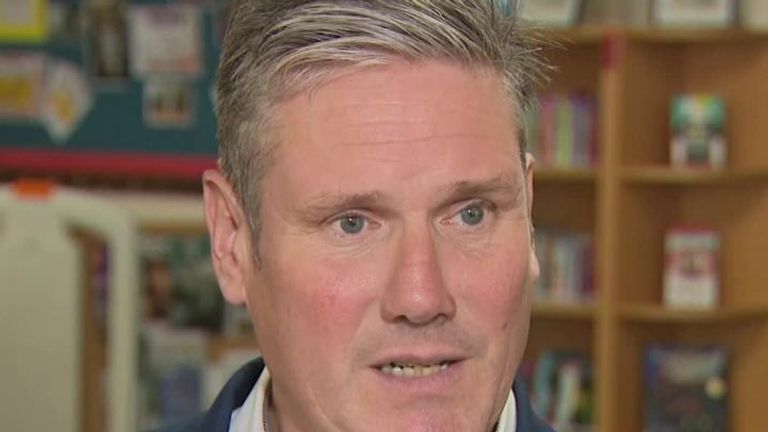GCSE top grades reach record high after exams cancelled for second year due to COVID-19 pandemic
After exams were cancelled for the second year in a row due to COVID-19, students were given results by their teachers and assessed only on what they have been taught during the pandemic.
Thursday 12 August 2021 12:21, UK
GCSE results have hit record highs again this year.
The proportion of UK pupils getting the top grades - that's a 7 or higher, equivalent to at least an A - is 28.9%, an increase of 2.7% on last year.
The overall pass rate also rose, with over three quarters - 77.1% - of pupils achieving a grade 4 or higher - that's equal to a C. That's up 0.8% on 2020.
The gap between boys and girls achieving one of the top three GCSE grades has risen from eight percentage points in 2020 to nine percentage points this year.
After exams were cancelled for the second year in a row due to COVID-19, students were given results by their teachers and assessed only on what they have been taught during the pandemic.
When exams were last held in 2019, only a fifth - 20.8% - achieved at least a 7.
The number of students in England who entered seven or more GCSEs and received a 9 - the highest grade - in all subjects has risen.
Some 3,606 students in England received straight 9s this summer, compared with 2,645 in 2020 and 837 in 2019.
An analysis by Ofqual found that 61.2% of private school entries in England were awarded a grade 7 or above, equivalent to an A or higher.
That's a 4% increase in absolute terms on last year - 1.3% higher than the rise in state schools.
Some 28.1% of entries at academies achieved at least a grade 7 this year, a 2.2 percentage point increase from last year's figure of 25.9%.
Teachers in England determined pupils' A-level and GCSE grades by taking into account their performance in mock exams, coursework and in-class assessments using questions by exam boards.
Exam boards were sent samples of student work and evidence used to determine the grades, as part of quality assurance checks.
Speaking to Kay Burley, schools minister Nick Gibb said pupils getting their results had been through an "exceptional year" due to the pandemic.
He said: "It wouldn't have been fair for children, young people, to sit exams when they've had such different experiences of COVID - the different levels of self-isolation and so on - so a teacher-assessed system was the best alternative to make sure they can go on to the next phase of their education or careers."
Mr Gibb added that ministers wanted pupils to return to sitting exams, saying: "We've already announced the adjustments to the exams - we expect all young people to be taking exams in 2022 but we will be making adjustments to those exams to reflect the fact that this cohort will have had disruption to their education as well.
"And the regulator Ofqual will be saying more about the grading standard that will be used for those exams in the autumn term."
Mr Gibb said the government wanted to get back to pre-pandemic achievement levels in the "longer term", when there was no year-on-year grade inflation.
He said: "We want to get back to that system in the longer run but we have to make sure that when we do that, that we are fair between different years, different cohorts - the ones who took their exams in 2020 and 2021, and the students who take their exams in the future."
Labour leader Sir Keir Starmer said inequality in education was "unforgivable" and pinned the blame on the government.
"Inequality in education is unforgivable, we should aim to close the gap in terms of attainment, we had huge inequality before pandemic - it just got worse," he said.
"The education secretary and government have handled this with a chaotic system, they should have had a Plan B, they did not put a plan in place and the net result is that the gap between private schools and state schools has gotten bigger."
Sir Keir added it was "pretty astonishing" that Education Secretary Gavin Williamson was still in post following the "chaotic" handling of school assessments and reiterated Labour's calls for him to resign.
Geoff Barton, general secretary of the Association of School and College Leaders (ASCL), said the teacher assessment system is "not directly comparable" to public exams and insisted the grades are "fair and accurate".
Professor Alan Smithers, director of the Centre for Education and Employment Research at the University of Buckingham, said plentiful top grades could lead parents to call for exams to be permanently scrapped.






